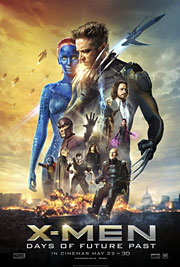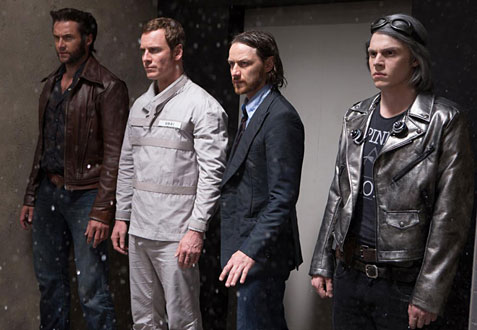Movie Review: “X-Men: Days of Future Past”

Just when it seemed like Fox was engineering a smart reboot of its X-Men franchise with “First Class,” the series’ original director, Bryan Singer, has returned to combine the old with the new in “X-Men: Days of Future Past.” That’s not exactly bad news for fans who appreciate the lengths that Singer has gone to in an attempt to fix the continuity issues within the X-movies, but by doing so, he’s tethered the prequels to the earlier films in a way that ensures they’ll never be able to exist on their own. And considering the potential of where the franchise was headed prior to this “sidequel,” it’s a little disappointing to see Singer turn his back on that initial vision. Granted, there’s still quite a bit to like about “Days of Future Past,” but it feels more like a step backward than the creative leap forward that Matthew Vaughn’s prequel pointed towards.
In the near future, mutants are being hunted down by advanced versions of Sentinel robots that can instantly adapt to any situation, making them impossible to defeat. With only a handful of X-Men remaining, Kitty Pryde (Ellen Page) uses her powers to send Logan’s (Hugh Jackman) consciousness back in time to his younger body circa 1973 in order to reunite Charles Xavier (James McAvoy) and Magneto (Michael Fassbender) for a single purpose: stopping Mystique (Jennifer Lawrence) from murdering the creator of the Sentinel program, Dr. Boliver Trask (Peter Dinklage), in the hope that it will alter the course of history. Meanwhile, the X-Men from the future must hold off an impending Sentinel attack to provide Logan enough time to complete his mission, although that’s much easier said than done.
Loosely based on Chris Claremont’s popular 1981 comic arc of the same name, “Days of Future Past” doesn’t have much in common with the source material apart from the general idea of traveling back in time to change the future. In fact, screenwriter Simon Kinberg would have been wise to stick closer to what made the original storyline so popular, because the script is where many of the movie’s biggest problems lie. It’s both narratively underwhelming and needlessly complex, while the plan to save Trask seems counterproductive to what the X-Men from both timelines are trying to achieve.
There’s also a surprising lack of character development compared to its predecessor, with McAvoy’s Xavier the only one with any real arc to speak of. Fassbender and Lawrence do the best they can with what little they’re given, but the main reason that “First Class” worked as well as it did was because of the relationships between the three characters. In “Days of Future Past,” they rarely share the screen together, and it suffers as a result. Additionally, for someone so essential to the plot, Jackman appears to be just along for the ride at times, and Dinklage (such a force on “Game of Thrones”) is wasted in a bland villain role that’s not very memorable.
“Days of Future Past” is exactly the kind of comic book movie that you’d expect in response to the blockbuster success of “The Avengers” – one more concerned with fan service than telling the best possible story. There’s no denying that Singer made two great X-Men films with the self-titled original and 2003 sequel, but it feels like he’s just going through the motions here, as if his familiarity with the characters has stunted his desire to try anything new. With that said, he does deliver a couple of really cool set pieces, including a prison break sequence involving Quicksilver (played by Evan Peters) that’s even better than the Nightcrawler White House attack from “X2.” It has everything – action, comedy, suspense – and Peters’ portrayal of the character is so much fun that his absence is felt for the rest of the movie, which is pretty ironic considering that the mutant speedster’s inclusion was the subject of an internet flame war last year.
The future scenes also contain some good action beats that bookend the 1973 section, but because many of the featured mutants (like Bishop, Blink, Warpath and Sunspot) are appearing on screen for the first time with almost no introduction, you don’t really care what happens to any of them, especially when the actors only have about three lines of dialogue combined. And that’s where “X-Men: Days of Future Past” stumbles, because while it’s certainly entertaining (thanks in no small part to the actors involved), it’s difficult to completely invest in the story. The movie works just fine as a big summer spectacle, but it could have been even better if as much care went into writing a smarter script as figuring out a way to bring back the original cast.
















